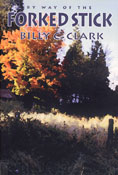By Way of the Forked Stick

- Author(s): Clark, Billy C.
- Series:
- Imprint: Univ Tennessee Press
- Publication Date: 2000-11-22
- Status: Active
- Available in Hardcover - Cloth: Price $22.50 | Buy Now
In the little Appalachian town of Sourwood, life at the end of the Great Depression may have been tough, but it was rich beyond compare.
Building on a distinguished body of work celebrating and preserving mountain culture, renowned writer Billy C. Clark once again revisits his boyhood during a bygone era. By Way of the Forked Stick offers four fictional stories drawn from the author’s childhood experiences of the 1930s—tales that vividly convey the down-home spirit of a lost way of life.
Clark’s youthful narrator introduces us to Apache, the charismatic termite exterminator who traded the boy a hound aptly named Sneakin. The narrator admits to his own share of sneaking—past the watchful eye of the never-smiling Beulah Whitlock into her picture show, where the scent of popcorn drew rats up from the river in droves. He recalls being drawn himself into the world of cockfighting, where handler Blinddog Alley was said to be able to talk to roosters. And he relates how his brother Caleb’s quest for girls led the boys into frequenting a church where “almost any movement was the sign that the Spirit was struggling to get inside you”—and where baptism at the Glory Hole in Sourwood Creek was only slightly less chilling than the minister’s handling of snakes.
Drawing on the region’s rich tradition of storytelling, Clark conveys the charm and color of Sourwood Mountain and its environs in finely honed yarns that brim with humor. Here are characters so authentic it seems as though they have stepped off the page: Apache’s wife, Lottie the gospel woman, and her brother Weasel; Hyford Copley who ran the projector at the theater; and Brother Brimstone with his cries of “Penance!” and fondness for serpents—not to mention the charming small-town girls that Caleb was always trying to woo.
Although Appalachian residents in the Depression era were considered among the most impoverished people in America, Clark shows how a young boy unaware of this supposed misfortune enjoyed life through the blessing of imagination. Billy C. Clark shares a childhood that was hard but wonderful—wanting for nothing but a good hound dog—in a book that will delight as surely as it rekindles our faith in vanishing values.
The Author: Billy C. Clark was the author of eleven other books, including Sourwood Tales and A Long Row to How. He received the Appalachian Treasure Award in 1999 and served as writer-in-residence at Longwood College and editor of Virginia Writing, having founded both that publication and Kentucky Writing.
